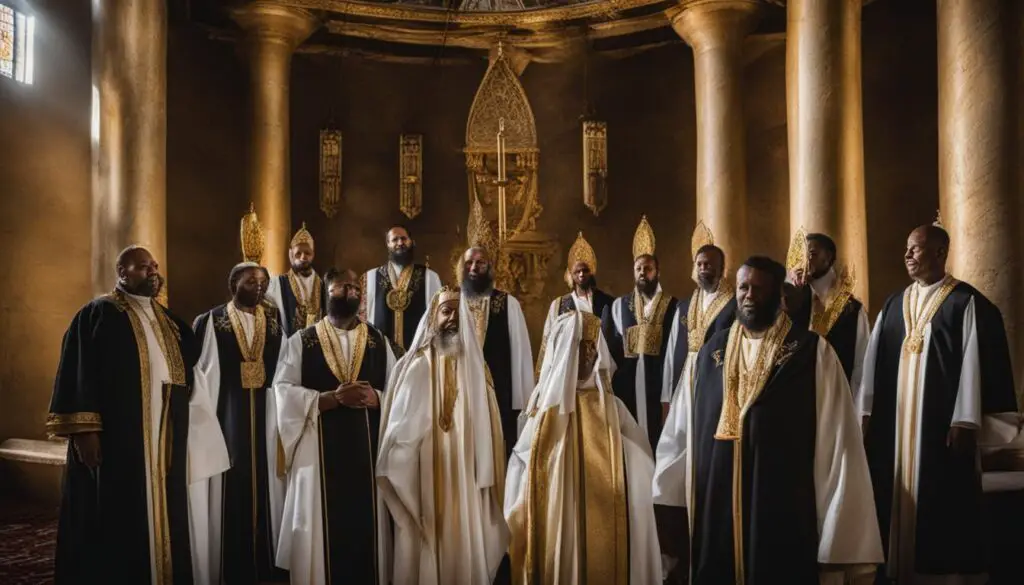Biblical worship holds a significant place in the lives of Christians, shaping their spiritual journey and deepening their connection with God. It is rooted in the beliefs and practices found in the Bible, encompassing worship in both the Old and New Testaments. By understanding the history, principles, and guidelines of biblical worship, believers can engage in worship that is authentic, meaningful, and transformative.
Worship practices in the Bible provide a roadmap for expressing our love, gratitude, and reverence to God. From the ancient sacrifices and rituals of the Old Testament to the communal gatherings and teachings of Jesus Christ in the New Testament, worship in Christianity has evolved while staying true to its biblical foundation.
The essence of biblical worship lies in its beliefs and doctrines. It involves acknowledging the greatness and holiness of God, offering praise and worship as an act of gratitude, and seeking a deeper relationship with Him. The biblical teachings on worship provide guidance and shape the theological understanding of worship, emphasizing the importance of heartfelt devotion and the role of worship as a means of spiritual growth.
Sacraments and rituals are integral components of biblical worship. In the Old Testament, various ceremonies and offerings were central to the worship experience. The New Testament introduced sacraments like baptism and communion, which hold deep symbolic significance and foster a sense of unity in the Christian community.
Leadership and clergy play crucial roles in guiding and facilitating worship. From the roles of priests and Levites in the Old Testament to the emphasis on the priesthood of all believers in the New Testament, biblical worship recognizes the importance of competent and devoted leaders who lead by example and equip the congregation for worship.
Biblical worship encompasses a diverse range of practices, including singing songs of praise, prayer, the reading and study of scripture, giving offerings, and participating in corporate worship gatherings. These practices provide opportunities for individual and communal expressions of faith and allow believers to connect with God in a personal and meaningful way.
Sacred texts, particularly the Bible, hold a central place in biblical worship. The inspired Word of God guides and informs worship through the reading and recitation of scripture, offering guidance, inspiration, and a deeper understanding of God’s character and His desire for His people to worship Him.
Denominations and sects within Christianity may have variations in worship practices, including music styles, liturgies, and other elements of worship. However, the essence of biblical worship remains the same across these groups, unifying believers in their devotion and reverence for God.
As contemporary challenges arise, biblical worship adapts to address the needs and context of the modern worshiper. Incorporating technology, addressing cultural influences, and embracing diverse worship styles are some of the ways worship can remain relevant and impactful in today’s world.
Exploring the essence of biblical worship allows us to deepen our spiritual journey, drawing closer to God and experiencing His presence in our lives. When we engage in worship that is rooted in biblical principles, our worship becomes a true expression of our love and devotion to God, transforming our hearts and shaping our lives.
Key Takeaways:
- 1. Biblical worship is rooted in the beliefs and practices found in the Bible.
- 2. It encompasses worship in both the Old and New Testaments, providing a roadmap for expressing gratitude and seeking a deeper relationship with God.
- 3. Worship practices in the Bible include singing, prayer, scripture reading, giving offerings, and participating in corporate worship gatherings.
- 4. Sacraments and rituals, such as baptism and communion, hold symbolic significance in Christian worship.
- 5. Leadership and clergy play important roles in guiding and facilitating worship, equipping the congregation for authentic and heartfelt worship experiences.
History and Origins of Biblical Worship
The history of biblical worship is deeply rooted in ancient times, reflecting the early forms of worship practices found throughout the Old Testament. From the moment humanity encountered God, worship became an integral part of their relationship with Him. In the Hebrew scriptures, worship revolved around the offering of sacrifices and the presentation of offerings to God, as a way of expressing devotion and seeking His favor.
Ancient Hebrew worship was characterized by its reliance on the sacrificial system, where priests would offer various types of sacrifices to atone for sins and demonstrate obedience to God’s commands. These acts of worship were not only a means of communication with God but also a way of ensuring the community’s spiritual well-being.
In the early Christian church, worship took on a new form with the teachings of Jesus Christ. The focus shifted from a predominantly sacrificial practice to a more communal and instructional approach. Worship became centered around the person of Jesus, His life, teachings, and sacrificial death on the cross. Christians gathered to commemorate His sacrifice and to learn from the Apostles, nurturing their faith and growing together as a body of believers.
This shift in worship form ushered in a new way of connecting with God, emphasizing the importance of fellowship, spiritual instruction, and the cultivation of a personal relationship with Jesus. This marked the transition from a predominantly ritualistic and sacrificial worship to a more relational and instructional approach.
Beliefs and Doctrines of Biblical Worship
Biblical worship is not a mere ritual or formality, but a profound expression of faith and devotion. It encapsulates the core beliefs and doctrines held by believers in their worship practices. Understanding these foundational principles is essential for engaging in worship that is authentic and spiritually enriching.
At the heart of biblical worship is the recognition of God’s greatness and holiness. The Bible teaches that God is worthy of all praise and adoration, and worship is a response to His majesty. Through worship, believers express their gratitude, awe, and reverence towards God.
“Worship the Lord in the splendor of his holiness; tremble before him, all the earth!” – Psalm 96:9
Worship is the believer’s joyful response to God’s worthiness, rooted in His attributes of love, mercy, justice, and sovereignty.
Biblical teachings on worship emphasize the importance of seeking a deeper relationship with God through worship. It is a means of drawing near to Him, aligning one’s heart and mind with His will, and experiencing His presence in a personal and transformative way.
The theology of worship is informed by a rich tapestry of biblical perspectives. From the Psalms, which serve as a hymnbook of powerful expressions of praise and worship, to the teachings of Jesus, who emphasized the importance of worshiping in spirit and truth, the Bible provides a diverse range of insights into the nature and practice of worship.
The Doctrinal Aspects of Worship
The doctrinal aspects of worship encompass various theological concepts that shape the understanding and practice of worship. These include:
- Incarnational Worship: Recognizing the presence of God in worship, understanding that He dwells among His people.
- Sacrificial Worship: Offering oneself as a living sacrifice, giving of one’s time, talents, and resources in worship.
- Celebratory Worship: Rejoicing and celebrating God’s goodness, faithfulness, and salvation.
- Confessional Worship: Acknowledging and confessing sins, seeking forgiveness, and experiencing the grace of God.
- Eucharistic Worship: Commemorating the life, death, and resurrection of Jesus Christ through the sacrament of communion.
A Biblical Perspective on Worship
The Bible provides a comprehensive framework for understanding worship. It emphasizes the vital role of the heart and attitude in worship, rather than external rituals or performances. Genuine worship is marked by sincerity, humility, and wholehearted devotion to God.
“Yet a time is coming and has now come when the true worshipers will worship the Father in the Spirit and in truth, for they are the kind of worshipers the Father seeks. God is spirit, and his worshipers must worship in the Spirit and in truth.” – John 4:23-24
True worship transcends outward forms and rituals, flowing from a sincere and authentic connection between the worshiper and the Creator.
Biblical teachings on worship not only focus on individual worship but also highlight the importance of corporate worship. Gathering as a community of believers to worship God fosters unity, mutual encouragement, and the edification of the body of Christ.
By aligning our beliefs and doctrines with the biblical teachings on worship, we can engage in worship that is rooted in truth, characterized by reverence, and transformative in its impact on our spiritual lives.

Sacraments and Rituals in Biblical Worship
Sacraments and rituals hold a significant place in biblical worship, serving as sacred and symbolic practices that deepen the spiritual connection between believers and God. The Old Testament presents a rich tapestry of ceremonies and rituals that were integral to worshiping God. These included offerings of sacrifices, the observance of feasts, and adherence to religious rites laid out in meticulous detail. For example, the sacrificial system played a vital role in Old Testament worship, as individuals offered animal sacrifices to atone for their sins and express their devotion to God.
In the New Testament, the focus shifted towards the sacraments, which are visible signs of God’s grace at work in the lives of believers. Two key sacraments emerged, namely baptism and communion (also known as the Lord’s Supper or the Eucharist). Baptism symbolizes the cleansing of sins and the believer’s identification with Christ’s death and resurrection. Through immersion, sprinkling, or pouring of water, individuals publicly proclaim their faith and commitment to following Jesus. Communion, on the other hand, represents the sharing of Christ’s body and blood through the consumption of bread and wine. It serves as a commemoration of Jesus’ sacrifice on the cross and a means of spiritual nourishment and unity among believers.

These sacraments and rituals in both the Old and New Testaments demonstrate the transformative power of biblical worship. They provide tangible ways for believers to engage with the divine, expressing their faith, repentance, gratitude, and commitment to God. Through sacraments and rituals, worshipers are reminded of their covenant relationship with God and are drawn into deeper communion with Him.
Leadership and Clergy in Biblical Worship
Leadership and clergy play a crucial role in the facilitation and guidance of biblical worship. In both the Old Testament and the New Testament, we find a clear understanding of the significance and responsibilities of worship leaders.
In the Old Testament, the priesthood held a central role in the worship practices of God’s people. The priests and Levites were designated as leaders who carried out specific duties related to offering sacrifices, conducting rituals, and maintaining the sanctity of the tabernacle or temple. They were the intermediaries between the people and God, leading the congregation in worship and representing their spiritual needs before Him.
Meanwhile, the New Testament highlights the concept of the priesthood of all believers. This biblical teaching emphasizes that every follower of Christ has a unique role and responsibility in worshiping and serving God. While there is no hierarchical priesthood as seen in the Old Testament, the New Testament recognizes the need for leaders in the church who are equipped to guide and nurture the congregation in worship.
The role of worship leaders in the New Testament is to provide spiritual leadership, teach and proclaim God’s Word, and facilitate an environment conducive to worship. They are called to model worship through their own lives and cultivate a culture of heartfelt devotion to God within the church.
Biblical worship leadership is not about prestige or power but is rooted in humility and servant-heartedness. It involves leading the congregation in prayer, leading in the selection of songs and hymns, and creating an atmosphere that encourages the congregation to connect with God on a personal and meaningful level.
Biblical Models of Worship Leadership
The Bible offers several examples of worship leaders who demonstrate different aspects of effective leadership and service in worship. King David, known as the “man after God’s own heart,” exemplified a passionate and uninhibited worshipper who led others in praise and adoration of God’s greatness.
Another notable example is the apostle Paul, who not only served as a missionary and teacher but also played a significant role in guiding and encouraging early Christian communities in their worship practices. His teachings on worship and the spiritual gifts also highlight the importance of diverse leadership roles within the church.
“Now these are the gifts Christ gave to the church: the apostles, the prophets, the evangelists, and the pastors and teachers. Their responsibility is to equip God’s people to do his work and build up the church, the body of Christ.” – Ephesians 4:11-12 (NLT)

As we explore the biblical view on worship leadership, it is important to remember that leadership is not limited to a select few but is a shared responsibility within the body of Christ. Every believer has the potential to contribute and serve in the ministry of worship, utilizing their gifts and abilities to honor and glorify God.
Worship Practices in Biblical Worship
Biblical worship is a diverse and expressive form of devotion, encompassing a range of practices that engage both the heart and the body. These practices reflect the deep reverence and adoration that believers have for their Creator and serve as a means of drawing closer to Him.

Forms of worship in the Bible are manifold, and they include:
- Singing: The expression of worship through joyful songs and psalms is a prevalent practice in biblical worship. Through music, believers offer praise, thanksgiving, and adoration to God.
- Prayer: Communication with God through prayer is an essential aspect of worship. In prayer, believers express their love, gratitude, and deepest desires to God, seeking His guidance and presence.
- Reading and Studying Scripture: The Word of God holds great significance in biblical worship. Through the reading and study of Scripture, believers gain spiritual nourishment, receive divine guidance, and deepen their understanding of God’s will.
- Giving Offerings: Giving offerings and tithes is an act of worship and obedience in biblical worship practices. It is a way to honor God and support His work on earth.
- Participating in Corporate Worship Gatherings: Coming together as a community to worship God is an integral part of biblical worship. Corporate worship allows believers to unite in praise, encourage one another, and experience God’s presence collectively.
These expressions of worship can take different forms, both individually and corporately. They provide believers with the opportunity to engage their hearts, minds, and bodies in worship, fostering a deeper connection with God and strengthening their faith.
Sacred Texts in Biblical Worship
In the realm of biblical worship, the importance of sacred texts cannot be underestimated. The Bible, revered as the inspired Word of God, holds a central place in worship practices, guiding and shaping the way believers approach and engage with God.

Scripture is incorporated into worship through the reading and recitation of biblical passages, allowing worshippers to connect with divine teachings and wisdom. In congregational settings, the reading of selected biblical verses or whole chapters not only imparts knowledge but also invites reflection, sparks inspiration, and ignites a deepened sense of spirituality.
The role of the Bible in worship extends beyond mere texts. It serves as a compass, offering guidance on how to structure and conduct worship services, whether in individual devotion or communal gatherings. Biblical passages on worship provide insights into the appropriate expressions of praise, the posture of the heart, and the desired attitude of worshippers.
“Let the message of Christ dwell among you richly as you teach and admonish one another with all wisdom through psalms, hymns, and songs from the Spirit, singing to God with gratitude in your hearts.” – Colossians 3:16 (NIV)
Throughout both the Old and New Testaments, there are numerous references to worship, its significance, and the attitudes God desires in His worshippers. These biblical worship scriptures form the foundation of worship practices, transforming them from mere traditions to spiritually meaningful encounters with the divine.
By grounding worship in the teachings of Scriptures, believers gain a deeper understanding of God’s character, His promises, and His desire for a genuine relationship with His people. The sacred texts provide a roadmap for both corporate and personal worship, highlighting the values, principles, and timeless truths that shape authentic worship experiences.
Prayer and Reflection:
Take a moment to reflect on the role of sacred texts in your own worship practice. How have biblical passages enriched your understanding of worship? In what ways have they influenced your approach to worship?
| Biblical Worship Scriptures | Key Teachings |
|---|---|
| Psalm 100:4 | Call to worship with joyful thanksgiving and praise |
| John 4:24 | Emphasis on worshipping God in spirit and truth |
| Psalm 95:6 | Encouragement to come before God with reverence and awe |
| 1 Chronicles 16:23-31 | Lifting up praise and declaring the greatness of God |
| Matthew 22:37-38 | Jesus’ commandment to love God with all heart, soul, and mind |
Denominations and Sects in Biblical Worship
Within Christianity, there exists a rich tapestry of denominations and sects, each with its own unique worship traditions and practices. While the core essence of biblical worship remains constant across these groups, there are variations in specific worship practices, music styles, liturgies, and other elements that reflect the diverse nature of biblical worship.
These denominations and sects represent the diverse expressions of worship in different Christian traditions. They embody the richness and beauty of biblical worship, adapting to the cultural, theological, and historical contexts in which they exist.
“Unity in diversity” truly encapsulates the spirit of worship in Christianity, as believers come together in worship, celebrating their shared faith while embracing their unique worship traditions.
“And they devoted themselves to the apostles’ teaching and the fellowship, to the breaking of bread and the prayers.” – Acts 2:42
While each denomination and sect has its own distinct worship practices, they are all rooted in the teachings of the Bible, with a focus on adoration, thanksgiving, confession, and supplication. Biblical worship invites believers into a deep and transformative relationship with God, anchored in His Word and guided by His Spirit.
The diversity in biblical worship reflects the beautiful mosaic of the body of Christ, where different denominations and sects bring their unique gifts, perspectives, and approaches to worship. Whether it’s the fervent praise and energetic worship of Pentecostal churches, the reverence and liturgical richness of Anglican worship, or the vibrant music and community-driven worship of evangelical churches, all of these expressions of worship allow believers to encounter and worship God in meaningful and authentic ways.
Worship Practices Across Denominations
While there may be variations in worship practices across denominations and sects, there are core elements that remain consistent throughout biblical worship:
- Prayer: A vital component of biblical worship, prayer allows believers to commune with God, express their hearts, and seek His guidance and presence.
- Singing and Music: Worshipers offer their praises to God through joyful songs, hymns, and spiritual songs, uplifting their spirits and cultivating an atmosphere of worship.
- Teaching and Preaching: The sharing and exposition of God’s Word play a central role in biblical worship, fostering spiritual growth, and nurturing faith.
- Sacraments: Baptism and communion, as instituted by Jesus Christ, serve as visible expressions of faith and participation in the life of the Christian community.
- Community and Fellowship: Worship extends beyond individual acts of devotion and encompasses the gathering of believers, fostering a sense of community, support, and love.
No matter the denomination or sect, these common elements of worship connect believers to their biblical heritage and facilitate a deeper spiritual experience with God.
Within the broader landscape of Christianity, denominations and sects offer a tapestry of worship expressions, reflecting the beauty and diversity of the body of Christ. Embracing these differences allows believers to appreciate the broad scope of biblical worship and to foster unity while celebrating the unique cultural, theological, and historical perspectives that shape worship practices.
| Denomination/Sect | Worship Traditions and Practices |
|---|---|
| Catholic Church | Liturgy, sacraments, use of incense, chanting, and reverence for saints |
| Protestant Churches | Variety of worship styles, ranging from traditional hymns to contemporary worship songs, emphasis on preaching, prayer, and congregational participation |
| Orthodox Churches | Rich liturgical traditions, icons, chanting, and a deep sense of reverence and mystery |
| Pentecostal Churches | Energetic worship, emphasis on spiritual gifts, expressive praise and worship, and a belief in the present-day work of the Holy Spirit |
| Evangelical Churches | Contemporary worship styles, emphasis on preaching, personal relationship with Jesus, and practical application of biblical teachings |
This table highlights just a few examples of the denominations and sects within Christianity, offering a glimpse into the richness of worship practices across different traditions.
In embracing denominations and sects, believers can foster unity, celebrating the shared beliefs and core essence of biblical worship, while also appreciating the diversity and unique contributions that each tradition brings. The unity and diversity in biblical worship reflect God’s heart for a united body of believers, worshiping Him in spirit and truth.
Contemporary Issues and Challenges in Biblical Worship
The modern world presents unique challenges to biblical worship practices. Adapting worship to the changing times is essential for engaging the hearts and minds of today’s worshipers. Cultural influences play a significant role in shaping worship experiences, requiring careful consideration to address diverse needs and preferences. Additionally, incorporating technology can enhance worship services, providing new avenues for expression and participation.
One of the challenges in biblical worship is finding ways to adapt traditional practices to the modern context. While the essence of worship remains the same, the methods and expressions may need to evolve to resonate with contemporary worshipers. This requires a delicate balance between preserving the timeless principles of worship and embracing relevant cultural expressions.
Cultural influences on worship cannot be ignored. As society continues to grow more diverse, worship must strive to be inclusive and sensitive to different cultural backgrounds. Incorporating elements from various cultures can create a rich and meaningful worship experience that reflects the unity and diversity of the body of Christ.
Addressing the needs of the modern worshiper is crucial for fostering a deep and authentic connection with God. This includes understanding the desires, struggles, and aspirations of worshipers in today’s world. Providing spaces for personal reflection, incorporating interactive elements, and offering opportunities for communal engagement can help meet the diverse needs of worshipers.
The integration of technology in worship services has become increasingly relevant. From projecting lyrics and scripture on screens to using multimedia presentations, technology offers new possibilities for enhancing worship experiences. It can create a visually engaging atmosphere, facilitate participation, and provide access to resources that deepen understanding and engagement with biblical teachings.
Incorporate technology can greatly expand the reach and impact of worship beyond the walls of the church, allowing people to connect with worship services remotely. Livestreaming services, online worship communities, and interactive digital platforms provide opportunities for worshipers to engage and participate even when physically distant.
To address these contemporary challenges, it is important for churches and worship leaders to approach worship with intentionality and discernment. By embracing both the timeless truths of biblical worship and the innovative opportunities of the modern world, the church can create worship experiences that are relevant, authentic, and spiritually transformative.
Let us now delve into the practical aspects of addressing these challenges and explore how worship leaders and congregations can adapt and navigate the ever-evolving landscape of biblical worship.
Embracing Biblical Worship for a Deeper Spiritual Journey
Biblical worship offers a transformative and meaningful way to deepen our spiritual journey. It is a practice that is firmly grounded in the history, beliefs, practices, and challenges found in the Bible. By immersing ourselves in the essence of biblical worship, we can engage in a worship experience that is authentic, heartfelt, and rooted in the teachings and principles revealed in the scriptures.
As we embrace biblical worship, we are invited to express our love and devotion to God in a genuine and profound manner. Through worship, we draw closer to Him, experiencing His presence in our lives in a tangible way. It becomes a true expression of our faith and an opportunity to connect with the divine on a deeper level.
Biblical worship encompasses a rich tapestry of beliefs, doctrines, sacraments, rituals, and practices that have evolved over time. It is nurtured by the leadership and guidance of clergy and religious leaders who dedicate themselves to facilitating meaningful worship experiences. From the singing of hymns to the reading and recitation of sacred texts, each element of worship is designed to create a sacred space in which believers can encounter God and be transformed.
As we navigate the contemporary landscape of worship, we must also address the challenges and issues that arise. We need to remain sensitive to cultural influences and adapt our worship practices to meet the needs of the modern worshiper. This may involve embracing technology in our services, creating inclusive spaces that welcome diverse individuals, and being open to new expressions of worship that resonate with the hearts of believers today.
May our journey of biblical worship be a continuous exploration of the depths of our faith, leading us to a greater understanding of God and His desires for our lives. May we engage in worship that is both ancient and relevant, timeless yet adaptable, as we seek to draw near to God and experience His transformative power in our lives.
FAQ
What is biblical worship?
Biblical worship refers to the beliefs and practices of worship found in the Bible. It encompasses the Old and New Testament teachings on worship, including guidelines for how to approach worship, the use of music and songs in worship, and the overall principles that inform worship practices in Christianity.
How has worship evolved throughout history?
Worship practices have evolved throughout history. In the Old Testament, worship centered around sacrifices and offerings to God. In the early Christian church, worship took on a new form, focusing more on communal gatherings and the teachings of Jesus Christ.
What are the beliefs and doctrines of biblical worship?
Biblical worship involves acknowledging the greatness and holiness of God, expressing gratitude and praise, and seeking a deeper relationship with Him through worship. The theological aspects of worship are informed by biblical teachings and the understanding of the nature of God.
What role do sacraments and rituals play in biblical worship?
In the Old Testament, various ceremonies and rituals, such as the offering of sacrifices and the observance of feasts, were central to worship. In the New Testament, the sacraments of baptism and communion hold a significant place in Christian worship.
What is the role of leadership and clergy in biblical worship?
In the Old Testament, priests and Levites had specific roles and responsibilities in leading worship. In the New Testament, there is an emphasis on the priesthood of all believers, but leaders still guide and equip the congregation in worship.
What are some common worship practices in biblical worship?
Biblical worship is expressed through various practices, including singing, prayer, reading and studying scripture, giving offerings, and participating in corporate worship gatherings.
How does the Bible relate to biblical worship?
The Bible holds a central place in biblical worship. It is considered the inspired Word of God and is incorporated into worship through the reading and recitation of scripture, as well as the use of biblical passages and teachings to guide and inform worship practices.
Are there variations in worship practices across different Christian denominations?
Yes, there are variations in worship practices across different Christian denominations. While the essence of biblical worship remains the same across these groups, specific practices, music styles, liturgies, and other elements of worship may vary.
What are some contemporary issues and challenges in biblical worship?
Contemporary issues and challenges in biblical worship include adapting worship practices to the modern context, addressing cultural influences on worship, incorporating technology in worship services, and meeting the diverse needs of modern worshipers.
How can embracing biblical worship enhance our spiritual journey?
Embracing biblical worship offers a transformative and meaningful way to deepen our spiritual journey. By understanding the history, beliefs, practices, and challenges of biblical worship, we can engage in worship that is authentic, heartfelt, and rooted in the teachings and principles found in the Bible. May our worship be a true expression of our love and devotion to God, drawing us closer to Him and experiencing His presence in our lives.
















